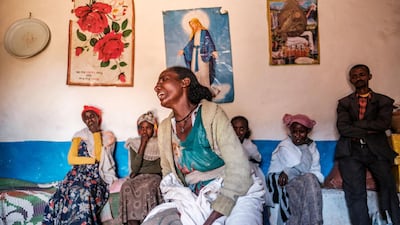The US on Thursday called on Ethiopia’s government to end the suffering in Tigray amid growing concerns of human rights violations and widespread suffering in the northern region.
After closed-door UN Security Council talks, US ambassador to the world body Linda Thomas-Greenfield said fighting in Tigray was having "devastating consequences for thousands of innocent people" and threatened the region's security.
The council met amid growing alarm over the crisis in Tigray, where more than five million people are caught up in fighting between Ethiopian and allied troops and those backing the fugitive Tigray leaders who once dominated the government.
“The onus to prevent further atrocities and human suffering falls squarely on the Ethiopian government's shoulders,” Ms Thomas-Greenfield said after council talks did not reach an agreement.
“We urge the Ethiopian government to support an immediate end to the fighting in Tigray.
"And to that end, the prompt withdrawal of Eritrean forces and Amhara regional forces from Tigray are essential steps.”
There have been new reports of rape and murder in Tigray, where clashes between Prime Minister Abiy Ahmed’s federal troops and members of the former Tigray People’s Liberation Front have claimed thousands of lives since they began in November.
Ms Thomas-Greenfield says that ending Tigray's conflict will be a priority for the Biden administration in March when the US, a major aid donor to Ethiopia, holds the Security Council's rotating presidency.
International media and relief workers have struggled to gain access to the mountainous region, but refugees leaving Tigray and others have spoken of rape, looting, massacres and other horrors.
The UN's Geneva-based human rights chief, Michelle Bachelet, earlier on Thursday described reports of "sexual and gender-based violence, extrajudicial killings" and property damage.
Ms Bachelet called for an independent assessment of refugees’ witness accounts.
A preliminary investigation has found that Ethiopia’s army, the Tigray People’s Liberation Front, the Eritrean military and troops and militia from the neighbouring Amhara region may have been responsible for serious human rights abuses, she said.
“Without prompt, impartial and transparent investigations and holding those responsible accountable, I fear violations will continue to be committed with impunity, and the situation will remain volatile for a long time to come,” Ms Bachelet said.
Amnesty International’s regional director in Africa, Sarah Jackson, said it was time to send “an international, impartial investigation to monitor and report” on alleged war crimes and other abuses in Tigray.
“Given the complexity and gravity of the situation, a UN-led investigation, rather than a joint investigation with Ethiopian institutions, is urgently needed to establish the truth and lay the foundations for accountability,” Ms Jackson said.
Action by the UN’s top body appeared unlikely on Thursday, given disagreements between its permanent members Britain, France, the US, Russia and China.
The National contacted Ethiopian and Eritrean diplomats for comment, but neither UN mission responded.
Addressing closed-door talks of the 15-nation council, UN humanitarian chief Mark Lowcock said that 4.5 million people in Tigray urgently need food, water, medicine and other assistance.
A lack of fresh water and washing facilities left locals at risk of waterborne diseases, measles and Covid-19, while less than a quarter of the region’s 205 health centres are fully open, a UN spokesman said.
“Much more needs to be done to get aid to people who need it,” he said.
Estonia’s UN envoy, Sven Jurgenson, said it was “unacceptable” that people in Tigray had gone without food, water and health care for the past four months.
Mr Jurgenson urged Ethiopia’s government to “step up its efforts to provide the basic services”.


